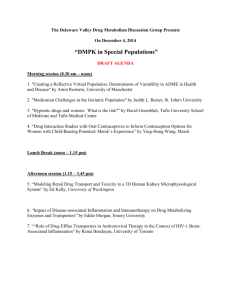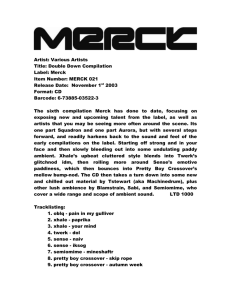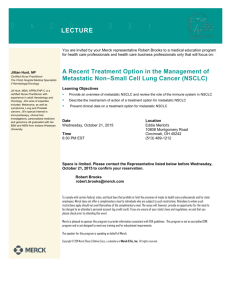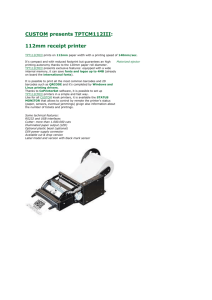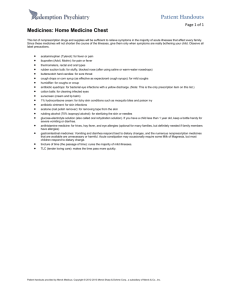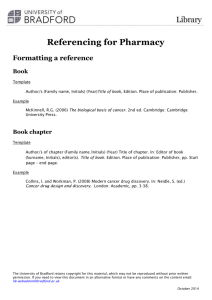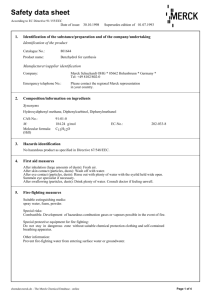IT case study | Merck
advertisement
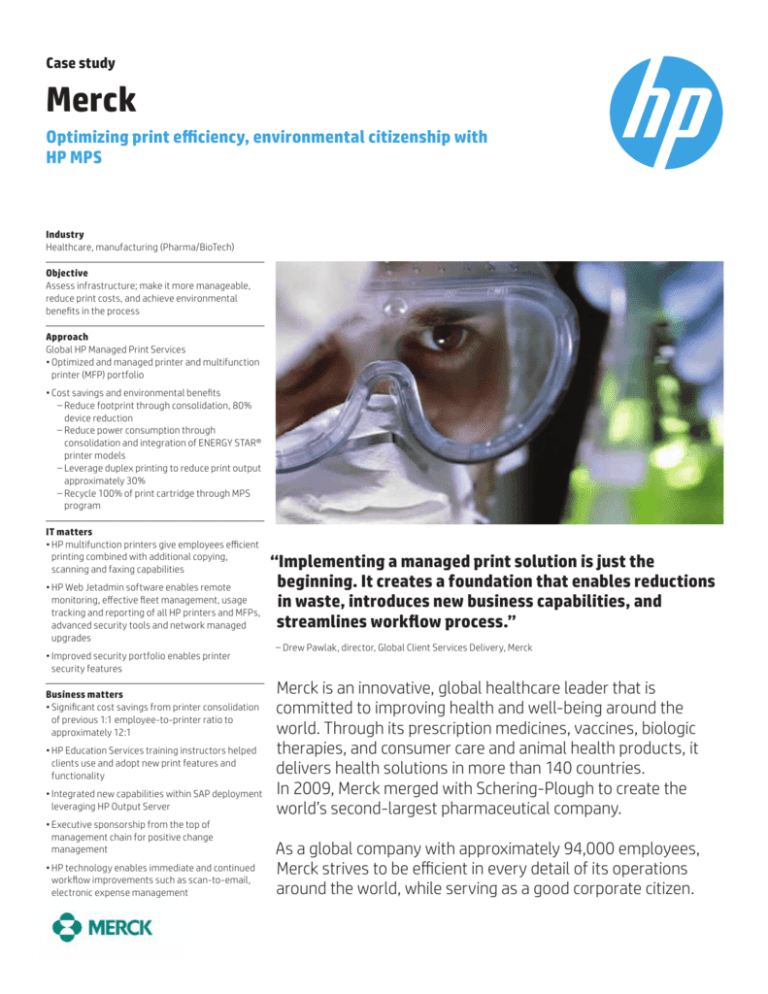
Case study Merck Optimizing print efficiency, environmental citizenship with HP MPS Industry Healthcare, manufacturing (Pharma/BioTech) Objective Assess infrastructure; make it more manageable, reduce print costs, and achieve environmental benefits in the process Approach Global HP Managed Print Services •Optimized and managed printer and multifunction printer (MFP) portfolio •Cost savings and environmental benefits – Reduce footprint through consolidation, 80% device reduction – Reduce power consumption through consolidation and integration of ENERGY STAR® printer models – Leverage duplex printing to reduce print output approximately 30% – Recycle 100% of print cartridge through MPS program IT matters •HP multifunction printers give employees efficient printing combined with additional copying, scanning and faxing capabilities •HP Web Jetadmin software enables remote monitoring, effective fleet management, usage tracking and reporting of all HP printers and MFPs, advanced security tools and network managed upgrades •Improved security portfolio enables printer security features Business matters •Significant cost savings from printer consolidation of previous 1:1 employee-to-printer ratio to approximately 12:1 •HP Education Services training instructors helped clients use and adopt new print features and functionality •Integrated new capabilities within SAP deployment leveraging HP Output Server •Executive sponsorship from the top of management chain for positive change management •HP technology enables immediate and continued workflow improvements such as scan-to-email, electronic expense management “Implementing a managed print solution is just the beginning. It creates a foundation that enables reductions in waste, introduces new business capabilities, and streamlines workflow process.” – Drew Pawlak, director, Global Client Services Delivery, Merck Merck is an innovative, global healthcare leader that is committed to improving health and well-being around the world. Through its prescription medicines, vaccines, biologic therapies, and consumer care and animal health products, it delivers health solutions in more than 140 countries. In 2009, Merck merged with Schering-Plough to create the world’s second-largest pharmaceutical company. As a global company with approximately 94,000 employees, Merck strives to be efficient in every detail of its operations around the world, while serving as a good corporate citizen. Case study | Merck Several years ago, the company targeted printing as an area where it could improve—on both counts. “We knew that enhanced print management, combined with use of more effective printing technology, would result in substantial cost savings,” recalls Tim Tingo, vice president, Technical Services for Merck. “What we soon realized is there are many other significant benefits.” After taking steps to improve print management on its own, Merck leveraged its relationship with HP to develop an overall HP Managed Print Service (MPS) solution. HP collaborated with Merck to optimize its printing infrastructure by transforming its fleet of personal printers into a small but managed set of shared devices. In addition to the consolidation of the fleet, business workflow solutions soon became possible due to the managed print solutions in place. Merck and HP work together to optimize, manage, and improve their printing environment. Today, Merck is a global leader in printing efficiency and environmental citizenship related to printing. “HP gets it,” says Drew Pawlak, director, Global Client Services Delivery. “They understand what clients are looking for, and they bring relevant products and services that help us solve business problems. They’re an extension of our team—truly a working partner.” MPS: a new approach to printing Not that long ago, about five years back, Pawlak says most Merck employees had a personal printer on their desk and a monolithic, heavy-duty copier nearby. Fax machines were scattered throughout offices. The cost of all that technology was high: it was expensive to acquire, use, and dispose of, and it was wasteful. Not long after, Merck surveyed the landscape and realized a new approach—leveraging multifunction printers and embracing a shared services model—would make a big difference. “If we could implement MPS successfully, we would reduce the footprint of printing, cut costs, and reduce the impact on the environment,” says Pawlak. Merck chose to work with HP as an established leader in printing with a growing portfolio of innovative printing and imaging products. HP’s experience in designing and implementing managed print services and solutions was 2 valued. In addition, HP’s global reach, both from a product availability and support perspective, matched Merck’s global needs. Merck standardizes, optimizes fleet Merck began working with HP to assess its printing needs at locations throughout the United States. An analysis of Merck’s printing environment showed managed print could reduce the company’s print costs substantially. To simplify the program and make it easier to maintain and support a new fleet, Merck chose to standardize on 10 HP printer and multifunction printer (MFP) models. With support from Merck’s top executives—who were among the first to give up their personal printers—the Merck team began deploying the new technology. Many employees were reluctant to give up their personal printers. “The convenience of having a local device was something employees valued,” Pawlak notes. “The benefits of the program—faster printing, larger formats, faxing, scanning, copying, color, and more—were obscured by a very emotional attachment to those personal printers.” Over time, however, employees started recognizing the benefits and, through the example set by executive sponsors, eased into the program. “It’s hard for people to justify keeping their personal printer when the CEO and CIO both gave up their own devices,” recalls Pawlak. To help manage the printer fleet more effectively, Merck began using HP Web Jetadmin software. It enables the company to monitor the status of devices for rapid troubleshooting, deploy driver updates, and get automated toner alerts. It also precisely tracks print volumes on every device, giving Merck and HP the data they need to optimize printer deployment based on usage. Merck also established a lab that includes every HP device Merck has deployed. There, the company can test new capabilities and updates, and perhaps most important, reproduce and quickly troubleshoot any printer problem at any Merck location worldwide. As the managed print program became more widely accepted, HP offered Merck innovative solutions for other print challenges. For example, workflow solutions were needed
